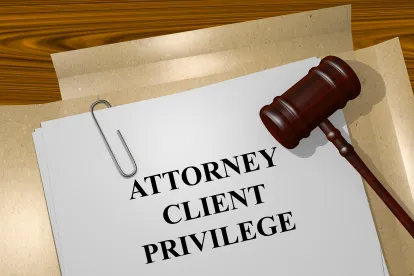The New York Court of Appeals recently clarified and reinforced the attorney-client privilege, explaining that certain internal training materials reflecting legal analysis of statutory, regulatory, and decisional law constituted attorney-client communications “prepared for the purpose of facilitating the rendition of legal advice or services, in the course of a professional relationship,” and rejected numerous arguments to the contrary.
In In re Appellate Advocates v. New York State Dept. of Corr. & Community Supervision, Appellate Advocates sought documents from the Department of Corrections and Community Supervision (“DOCCS”) pursuant to New York’s Freedom of Information Law. Although DOCCS produced some documents, it withheld others, asserting that they were protected by the attorney-client privilege. The dispute centered on whether the withheld documents – which were prepared by DOCCS counsel and contained legal advice regarding compliance with parole determinations, including summaries of court decisions and advice on the applicability of statutes, regulations, and case law to parole determinations – were, in fact, covered by the attorney-client privilege.
The Court concluded that they were. Specifically, it found it was “clear from the documents’ content and the context in which they were prepared and presented—i.e. for training and advising commissioners on how to dispatch their duties and obligations in deciding parole applications—that these documents are privileged communications from counsel to client.”
Importantly, the Court also shut down several of Appellate Advocates’ arguments:
- First, the Court rejected their argument that communications must involve an existing “real world factual situation,” such as litigation or a pending action, in order to be privileged. Lawyers frequently advise clients on how to comply with the law in order to avoid litigation, and such communications are no less privileged than those exchanged in the midst of litigation.
- Second, the Court was unconvinced that the privilege is triggered only by a client’s “disclosure of confidential information or a direct request for advice.” Even absent the client’s initiation of the communication, the Court explained that documents containing a lawyer’s advice will still be privileged so long as they are “made for the purpose of facilitating the rendition of legal advice or services in the course of a professional relationship.”
- Third, the Court disagreed that training materials are per se not privileged. Here, counsel had prepared materials for DOCCS Commissioners’ use during Board of Parole Training, which were privileged because they provided the Commissioners with legal analysis and advice pertaining to their decisions on whether to grant parole.
- Fourth and finally, the court rejected Appellate Advocates’ public policy argument that the transparency of parole board determinations should trump attorney-client privilege. Although both policies are important, society at large benefits immensely from candid conversations between government lawyers and government actors on “how to lawfully fulfill their public duties.”
Clients and counsel alike should be aware of the contours of the attorney-client privilege to ensure that their confidential communications remain protected. Although this case arises in the context of a public agency, the analysis should apply equally to private entities. As a result, internal training materials “prepared for the purpose of facilitating the provision of legal advice” should be protected by the attorney-client privilege in New York.



 />i
/>i
